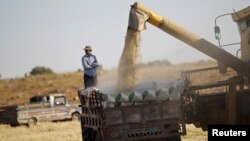Intensified fighting in Syria's main wheat-growing areas in the north this year will make it even more difficult for farmers to access fields and could hamper planting more cereals this season, a senior U.N. food agency official said.
Conditions for farmers were deteriorating despite a favorable weather outlook indicating a good rainy season for a second year in a row, said Abdessalam Ould Ahmed, the U.N's Food and Agriculture Organization's assistant director-general and regional representative for North Africa and the Near East.
"The conflict in Syria has further escalated, and its impact on production has worsened," Ould Ahmed said. "Conditions are extremely difficult inside Syria today for agriculture production, and there are many disincentives for farmers to keep farming on their fields, including security concerns, difficulties to store and sell their products."
He said fighting had intensified "in Syria's breadbasket provinces," a reference to the provinces of Hasaka, Raqqa and Deir al-Zor that alone account for nearly 70 percent of the country's total wheat production.
These areas have seen heavy fighting this year between the Kurdish YPG militia, backed by U.S.-led airstrikes, and Islamic State militants. It has been the heaviest fighting in those areas since the start of the war.
Fighting has also intensified in Aleppo province, in the rich agricultural Sahl al-Ghab Plain in Hama province, and in the northwestern province of Idlib, all of them arable areas.
Last year's rainy season, which came early and helped timely planting, was the best in a decade, helping to boost wheat production to an estimated 2.445 million tonnes in 2015, significantly better than the drought-stricken year before.
Barley production was 986,000 tonnes in 2015, the best since 2006, even though it came from a smaller cultivated area, the FAO official said.
But the heavy rainy season did little to halt the drop in the cultivated area in 2015, which had fallen "systematically" since the start of conflict in 2011. The estimated harvested wheat areas are now the smallest since the 1960s. Wheat production was still 40 percent lower than pre-conflict levels.
The FAO is expanding operations across Syria, with more seed distribution and technical assistance to partially slow the shrinkage in farmland, Ould Ahmed said.
Storage, transport, sales issues
Ould Ahmed also warned that the scale of conflict was worsening the already difficult conditions farmers are facing in the storage, transport and marketing of agricultural goods.
Inflation has also risen because of the depreciation of the local currency against the dollar, and higher fuel costs alongside chronic fertilizer shortages have pushed up production costs, he added.
"The difficulty facing farmers in transporting their harvest across front lines, where each time they cross they have to pay a part of their product, are all going to get worse," he said.
Lower food production is now making Syria more dependent on food handouts by the World Food Program and other agencies. Import needs are growing even though the absence of millions of Syrian refugees has in general reduced food needs inside the country, he said. In addition, the imports will cost more because of much higher insurance premiums.
In Syria, a country that was once self-sufficient but is now producing only half the food it consumes, more than half of the population is undernourished and food-insecure, Ould Ahmed said, citing FAO statistics.
The agricultural sector was also dealt a heavy blow by the breakdown of a centralized government system that provided farmers with subsidized seeds, fuel and an elaborate. attractively priced buyback of wheat immediately after the harvest.





